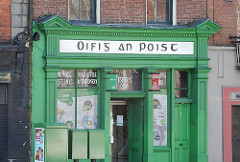1.1 Unless you speak Gaelic
Olga está preparando su visita a Derry. Ha decidido comprarse una pequeña guía de viaje y en la tienda le han ofrecido un folleto de lo que puede hacer y ver en Derry. Pero Olga no entiende lo que pone, así que le pregunta a la dependienta:
Olga: Sorry, but can you help me, please?
Shop assistant: Sure!
Olga: I don't understand some words on this leaflet*.
Shop assistant: Let me see! Where is it?
Olga: Here, it says "Fáilte!" What does it mean?
Shop assistant: Oh, it is Gaelic. Unless you speak Gaelic, you will not understand this leaflet!
Olga: Gaelic?
Shop assistant: Oh yes! In Ireland they speak English, of course, but they also speak Gaelic. It is a Celtic language. For example, "Fáilte!" means "Welcome!"
Olga: I see...
Shop Assistant: Let me give you a leaflet in English!
Olga: Thank you very much!
*leaflet: folleto
Reflexión
Vuelve a leer la frase que está en negrita en el diálogo: Unless you speak Gaelic, you will not understand this leaflet!
¿Qué tiempos verbales hay? ¿Qué tipo de oraciones llevan esos tiempos verbales?
Importante
UNLESS
 |
| Imagen en Flickr de Nadia Clabassi bajo licencia CC |
Unless es otra palabra que introduce una oración condicional. Significa "a no ser que", por lo que expresa una oración negativa. Es igual que si usaramos if y un verbo en negativo. Fíjate en el ejemplo:
If you don't speak Gaelic, you will not understand this leaflet!
Se podría decir también:
Unless you speak Gaelic, you will not understand this leaflet!
La única diferencia está en el verbo, ya que con UNLESS éste ha de ir en afirmativa. A continuación tienes otros ejemplos útiles:
If you don't study, you won't pass the test. (Si no estudias, no aprobarás el examen)
Unless you study, you won't pass the test. (A no ser que estudies, no aprobarás el examen)
I will leave if you don't apologize. (Me marcharé si no me pides disculpas)
I will leave unless you apologize. (Me marcharé a no ser que me pidas disculpas)
Actividad desplegable
Decide en cada frase si hay que usar IF o UNLESS:
Rellenar huecos
Reescribe las frases con UNLESS como en el ejemplo:
If she doesn't speak louder, I won't hear her.
Unless she speaks louder, I won't hear her.
Curiosidad
Si tienes curiosidad por el Gaélico te dejamos unos pocos datos referentes a este idioma:
- Hay tres principales variedades del idioma: el irlandés, el escocés y el manés (hablado en la Isla de Man).
- En algunas zonas de la República de Irlanda sobre todo, es la lengua materna de muchos habitantes.
- En Irlanda se aprende Gaélico como asignatura en la escuela.
- Dentro de cada tipo de Gaélico, existen diferentes dialectos.
 |
| Imagen en Flickr de Michael Coghlan bajo licencia CC |
Si alguna vez visitaras uno de los países donde existe este idioma, no debes preocuparte. El inglés también se habla en esas zonas y así te resultaría más fácil. En el siguiente enlace, si te apetece, tienes expresiones útiles en Gaélico Irlandés y su pronunciación: